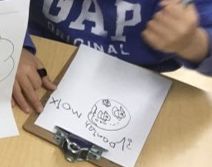Children learn to show their ideas on paper gradually. They begin with pictures, eventually experimenting with strings of letters or “pretend writing,” and eventually work their way towards what we can identify as words and sentences. This does not happen overnight, and each stage of writing development is valuable and worthwhile!
In order to help your child develop confidence as a writer at home, here are some helpful tips:
- Give them lots of opportunities to use pictures to show different kinds of ideas (made up stories, family adventures, retelling a familiar story from a favourite book, drawing about a nature wonder they have)
- Encourage them to check their picture for details: Have they answered the important “who, what, where” questions? Is their idea clear? What kinds of details would help their reader understand their message even better?
- After drawing their picture, can they label any of the people or objects in it? Writing “mom” next to my picture of my mom or “ball” next to my ball helps my reader know what the pictures are trying to say.
- When writing words, help your child “trust their sounds.” This means that they say the word to themselves slowly, and s-t-r-e-t-c-h out the sounds, writing each as they hear them. At first, they may only hear one or two sounds and only write down a couple of letters. That’s okay! They might even get the letters wrong. Also okay! The key is that they do this themselves, to develop confidence in their abilities and practice some foundational phonetic skills that they will build on as they move forward in their writing journey.
- Remind them that using “kid spelling” is great! This inventive spelling that children create when sounding things out is an important step in their writing development. I like to tell them that they don’t need to worry about “book spelling” (meaning conventional spelling) because they aren’t books! So don’t worry if they don’t spell things “right.”
It helps to continue to practice letters and letter sound with your child in fun and engaging ways, like their Alphabet Jive book, rhyming songs, and ABC books. Help them notice letters around them, showing them the sounds they make. This helps them build the knowledge necessary to use in their writing as they sound things out!
Thank you for your continued support! You’re doing great!

Leave a Reply